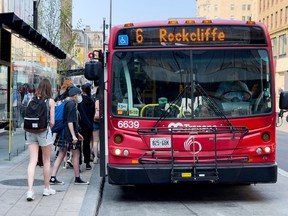Giving half the road to idle cars is bad for business, the climate and transit.
Article content
OC Transpo has revealed that its most popular bus routes are late 40 per cent of the time. Hardly shocking news to any regular transit rider, but the underlying cause is rarely talked about. Along many major transit arteries, buses have to crawl through a sea of cars to get to their destination, making them slow, late and unreliable.
The problem is not unique to Ottawa, but other cities have addressed it with an elegant solution: dedicated bus lanes. From Toronto to New York, Portland to Hamilton, letting buses bypass traffic on busy roads shortened trip times by 20 per cent consistently, and double that during periods of peak delay. When transit got faster and more reliable, higher ridership followed.
Advertisement 2
Article content
Article content
Bus lanes are a simple, cheap and effective solution to what ails public transit. So why doesn’t Ottawa have any on its most beleaguered routes?
A lack of political will is usually a safe answer, and for roads with lanes to spare — such as Carling Avenue, Baseline Road or Robertson Road — it’s probably the right one. But on other streets, there is a complicating factor: street parking. No one wants to mess with street parking. After all, removing it would hurt local businesses, right?
Not quite. Surveys of Montreal and Philadelphia found retail did better on streets without parking. Cars may take up a lot of space but they don’t carry that many people, leading small-business owners to vastly overestimate how many patrons actually drive. Studies from Toronto, Los Angeles and Berlin show most shoppers live locally and walk; 20 to 30 per cent take transit; and less than 10 per cent drive. Admittedly, these places have much better transit and higher density than Ottawa — but that really says it all. We don’t need parking to have a vibrant community; city planning has simply failed to deliver it by any other means.
Advertisement 3
Article content
Buses can move five times as many people as private vehicles every hour when they have a dedicated lane. How many more people could visit shops, enjoy parks and access services along Bank, Rideau Wellington streets, or Richmond Road, if routes such as the 6, 7, 11, 12 and 14 could get them there quickly and reliably?
Cities encourage what they accommodate. By designing streets for cars, we ensure more driving. More bus lanes and more service would make transit an attractive option to more people. It would improve access to the city, lower emissions and save people money on the ever-soaring costs of car ownership and ride-hailing.
The Transitway used to be Ottawa’s claim to fame, an innovation in transit priority infrastructure. Now the most we get are “peak hour” bus lanes. These revert to parking during so-called “off peak” periods such as midday and weekends (when traffic can be just as painful to bus through), failing to serve the very riders we should be trying to attract more of.
They are also less effective. A good bus lane is self-enforcing, with solid red paint and big block letters clearly communicating the lane is not for driving. San Francisco observed hundreds fewer violations on red carpet bus lanes than ones with minimal markings, and — as someone who lives near Rideau Street — I can personally attest to how common it is for drivers to completely disregard the bus lanes during peak hours.
Advertisement 4
Article content
Our transit system has many problems, from poor management and austerity budgets to a lack of concern for and involvement of riders in the planning process. But some things are simple. We can free the bus by making outer lanes into bus lanes on major roads. It is absurd that city planning has surrendered our streets so completely to cars at the expense of anything else. The car only reigns supreme as a policy choice. Set the bus up for success and we’ll unlock its full potential: an efficient, low-carbon, affordable transportation system for all.
Nick Grover is an executive member of Free Transit Ottawa, a grassroots community group advocating for affordable, reliable and accessible transit in Ottawa.
Article content


